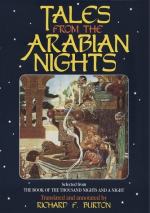[FN#31] Lane translates “Anisa-kum” by “he hath delighted you by his arrival”; Mr. Payne “I commend him to you.”
[FN#32] Arab. “Faturat,"=light food for the early breakfast of which the “Fatirah"-cake was a favourite item. See vol. i. 300.
[FN#33] A dark red dye (Lane).
[FN#34] Arab. “Jadid,” see vol. viii. 121.
[FN#35] Both the texts read thus, but the reading has little sense. Ma’aruf probably would say, “I fear that my loads will be long coming.”
[FN#36] One of the many formulas of polite refusal.
[FN#37] Each bazar, in a large city like Damascus, has its tall and heavy wooden doors which are locked every evening and opened in the morning by the Ghafir or guard. The “silver key,” however, always lets one in.
[FN#38] Arab. “Wa la Kabbata hamiyah,” a Cairene vulgarism meaning, “There came nothing to profit him nor to rid the people of him.”
[FN#39] Arab. “Kammir,” i.e. brown it before the fire, toast it.
[FN#40] It is insinuated that he had lied till he himself believed the lie to be truth—not an uncommon process, I may remark.
[FN#41] Arab. “Rijal"=the Men, equivalent to the Walis, Saints or Santons; with perhaps an allusion to the Rijal al-Ghayb, the Invisible Controls concerning whom I have quoted Herklots in vol. ii. 211.
[FN#42] A saying attributed to Al-Hariri (Lane). It is good enough to be his: the Persians say, “Cut not down the tree thou plantedst,” and the idea is universal throughout the East.
[FN#43] A quotation from Al-Hariri (Ass. of the Badawin). Ash’ab (ob. A.H. 54), a Medinite servant of Caliph Osman, was proverbial for greed and sanguine, Micawber-like expectation of “windfalls.” The Scholiast Al-Sharishi (of Xeres) describes him in Theophrastic style. He never saw a man put hand to pocket without expecting a present, or a funeral go by without hoping for a legacy, or a bridal procession without preparing his own house, hoping they might bring the bride to him by mistake. * * * When asked if he knew aught greedier than himself he said “Yes; a sheep I once kept upon my terrace-roof seeing a rainbow mistook it for a rope of hay and jumping to seize it broke its neck!” Hence “Ash’ab’s sheep” became a by-word (Preston tells the tale in full, p. 288).
[FN#44] i.e. “Show a miser money and hold him back, if you can.”
[FN#45] He wants L40,000 to begin with.
[FN#46] i.e. Arab. “Sabihat al-’urs” the morning after the wedding. See vol. i. 269.
[FN#47] Another sign of modern composition as in Kamar al-Zaman II.
[FN#48] Arab. “Al-Jink” (from Turk.) are boys and youths mostly Jews, Armenians, Greeks and Turks, who dress in woman’s dress with long hair braided. Lane (M. E. chapts. xix. and xxv.) gives same account of the customs of the “Gink” (as the Egyptians call them) but cannot enter into details concerning these catamites. Respectable Moslems often employ them to dance at festivals in preference to the Ghawazi-women, a freak of Mohammedan decorum. When they grow old they often preserve their costume, and a glance at them makes a European’s blood run cold.




